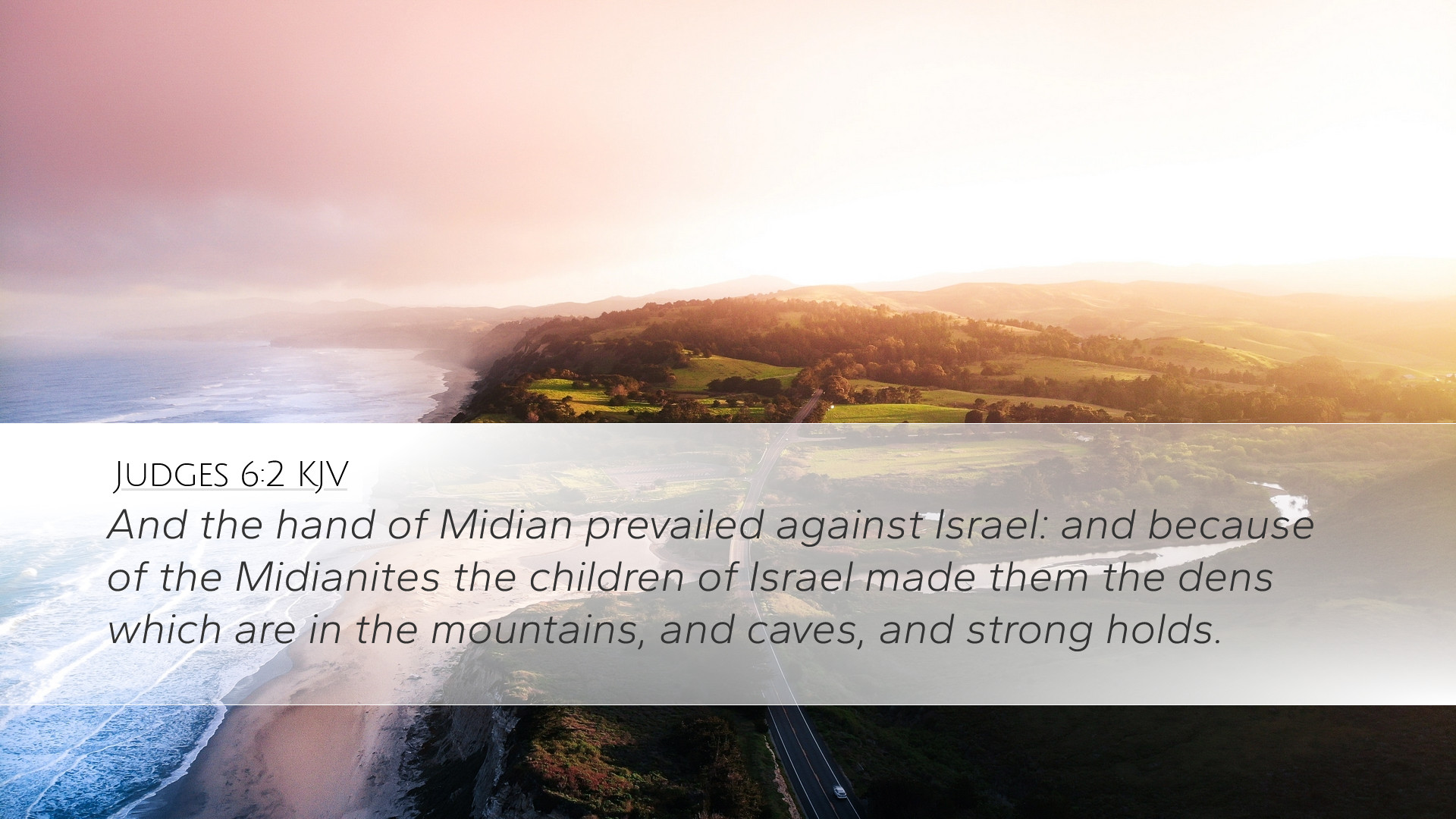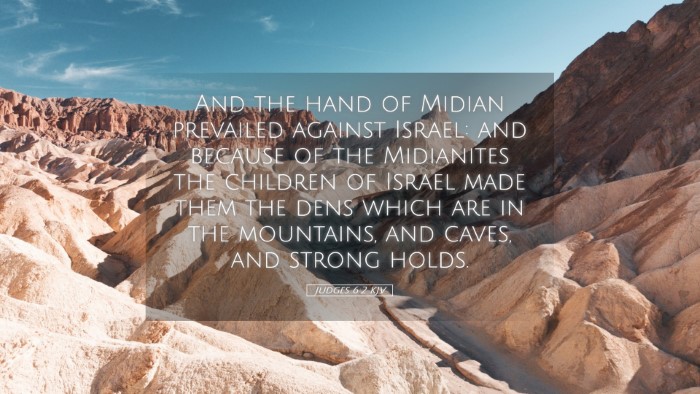Commentary on Judges 6:2
Judges 6:2 states, "And the hand of Midian prevailed against Israel; and because of the Midianites the children of Israel made them the dens which are in the mountains, and caves, and strong holds."
Contextual Background
This verse finds itself at a crucial juncture in the narrative of the Israelite judges. The Midianites, along with the Amalekites and others, oppressed the Israelites, leading to national despair and a call for deliverance. It serves as a backdrop to the story of Gideon, a significant figure in the book of Judges.
Insights from Matthew Henry
Matthew Henry reflects deeply on the implications of "the hand of Midian" prevailing against Israel. He emphasizes that oppression often leads people to seek refuge in places of concealment, highlighting Israel's plight of retreating into "dens" and "caves." Henry interprets this as a metaphor for spiritual defeat:
- Spiritual Deterioration: Henry suggests that Israel's retreat into caves represents a metaphor for the spiritual state of being hidden from God’s presence.
- Need for Repentance: The oppression serves to drive the Israelites to a place of desperation, ultimately leading them to seek God fervently.
Albert Barnes' Interpretation
Albert Barnes provides a historical context, noting that the Midianites were a nomadic people who invaded the lands of Israel during harvest time, destroying crops and stealing livestock. He points out the economic impact of this oppression:
- Destruction of Economic Stability: The cycles of oppression led to famine and deprivation, causing significant distress among the people.
- Military Necessity: The forced accommodation in the mountains underscores their need for self-defense against a much stronger foe, illustrating the frailty of Israel at this time.
Barnes encourages readers to understand the broader implications of God's judgment upon Israel for their unfaithfulness, which opens the door for the Midianite oppression.
Adam Clarke’s Perspective
Adam Clarke takes a more theological approach, emphasizing the sovereignty of God even in trying times. He notes:
- God's Sovereign Control: Clarke asserts that God allows oppression as a means of discipline, refining Israel’s faith and turning them back to Himself.
- Call for Deliverance: The dire situation leads to a greater anticipation for a savior, a theme that resonates with the character of Gideon.
Clarke encourages believers to see the hand of God in their adversity, suggesting that it prompts a call to personal and communal repentance, and affirms God's readiness to rescue His people.
Theological Implications
The oppression by the Midianites is a poignant reminder of the consequences of disobedience and idolatry. This verse encapsulates several theological themes:
- The Justice of God: The painful plight of Israel is a reflection of God's justice in punishing His people for their sins.
- Hope Through Despair: The narrative pushes towards hope, as Israel's suffering leads them to cry out to God for deliverance, highlighted in the subsequent verses leading to Gideon's calling.
- Faith Under Oppression: For pastors and theologians, this verse ignites discussions on faithfulness amid trials and God's faithful response.
Application for Today
This passage continues to resonate with modern readers. Pastors and leaders can draw parallels between the Israelites' plight and current societal injustices:
- Facing Modern Oppressions: Just as the Israelites faced their oppressors, contemporary believers also fight against spiritual and cultural Goliaths.
- Call to Community Support: Encouraging the community to come together in times of distress can create a refuge, much like the dens and caves were for Israel.
- Hope in Redemption: This verse teaches that despair can lead to a renewed faith and a stronger relationship with God, promising His deliverance.
Conclusion
Judges 6:2 encapsulates Israel's plight during a turbulent time of oppression, illustrating the cycles of sin, judgment, and the desperate need for deliverance. The insights from Matthew Henry, Albert Barnes, and Adam Clarke emphasize both the immediate context and broader theological themes that invite reflection and application in today’s world.


